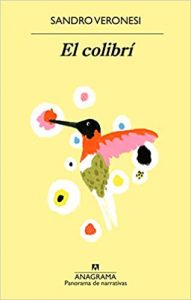Two of the last Italian Stregana awards for works of fiction (of the most outstanding in Italy in literature) were awarded to two authors as interesting as cogneti in 2017 and now to Sandro Veronesi, who was already repeating the award. And this shows that a great award is not necessarily the exclusive preserve of works selected almost by hand to immediately satisfy commercial ambitions.
Because both Cogenti and Veronesi build their novels from a convulsive intention of conscience, a disruptive and avant-garde interest, perhaps not moralizing, but at least stimulating for that critical or transcendental spirit that completes literature with its necessary coating.
In the specific case of Veronesi, one only has to see his delivery also in non-fiction works to social aspects such as the current problem of migration. In his book «Save lives in the Mediterranean«, Tries to open our eyes once more to see the human dilemma so often overlooked with disdain.
As for his novels, Sandro Veronesi achieves that reading implication that always gets the splash that can never leave you indifferent. Veronesi even novels his own life and makes literature crude truth, to the taste of palates capable of digesting that variable flavor as life itself is tasted, with delight in some bites interspersed with others of pure aversion from the tragic. Those last ones are the ones that need good drinks of life to pass them. A mixture that is everything, even our contradictions ...
Top 3 recommended books by Sandro Veronesi
The hummingbird
It's funny how in the different we get the best of empathies. In fragility we discover ourselves exposed and only then do we launch ourselves to the defense of lost causes, of vital challenges, of the magical compensation of losers from the cradle.
The hummingbird is a small bird that has the ability to stay suspended in the air. When he was a child, his mother called Marco Carrera a hummingbird because of his short stature.
The growth problem was solved with injections of hormones, but Marco has remained a hummingbird because of his ability to stay in the air despite adversity. One day his wife's psychoanalyst visits him in his office and, bypassing professional secrecy, warns him that she has discovered that she continues to correspond with a young love.
It will not be the only conflict that Marco will have to face: he will have to take care of his sick parents; He must try to reconcile with his brother, because the shadow of the tragic end of his sister many years ago hangs over them, and he must also take care of his granddaughter when his daughter, a single mother, stops being able to do so ...
Quiet Chaos
The most egregious tradeoffs often don't make the decision possible. And if regretting a decision determined as bad already supposes a dose of misguided guilt, when the luck of the facts lead to that dilemma where everything happens without choice, the final derivative is a blind guilt, an uncomfortable transition towards the dark certainty of that we are puppets in the hands of a capricious and sinister destiny.
The life of Pietro Paladini, an executive of a pay television, suffers a seizure one day when, while he is about to die by drowning while saving a stranger, he loses the woman he was going to marry in a few days. Installed in a "calm chaos", Pietro will gradually become the epicenter of a world that transfers his own suffering to him.
We thus witness a progressively comic pilgrimage of characters: a successful brother with a Peter Pan complex; a deranged sister-in-law; the woman he saved; his co-workers and his bosses, who try to overcome his calm equidistance and draw him into their own ranks.
Only her daughter will find the way that allows them to continue living, accepting the impositions of maturity. Sandro Veronesi captures in this novel the chaos of our cities, of our families in crisis, of an economy founded not on the value of work, but on pure speculation.
Prophecy
Each one writes the history of their paternal relationship as best they can. Because there is something special between parents and children, perhaps too many silences that end up going through when the end is predicted. And then everything can precipitate in a cascade of emotions along Big Fish, transforming a relationship that never was, but that is worth reviewing based on affection, memories and imagination.
Some time after the death of his mother, Alessandro Veronesi will also have to face his father's terminal illness. This situation, in which the traditional roles of father and son are reversed, with the latter acting as guide, will give way to tragic but also grotesque moments: the bureaucracy associated with the disease, the hypocrisy of euthanasia that hides its name, the difficult selection of caregivers, the dying man's flashes of humor, the heartbreaking paranoia.
Unanimously acclaimed by critics, Prophecy offers us the well-known story of the death of parents in a new light, thanks to its narrative wisdom: an unusual point of view (the you of a split that ends up also involving the reader) and the use of a future that, as the title indicates, refers to apocalyptic texts (because it is a small daily apocalypse here).
This volume is completed by two other stories that also have parent-child relationships as their main theme. The first tells the story of a young man who tries to give a posthumous meaning to the death (and perhaps his entire life) of his father through what we might call "an ethic of resentment." The second, on the other hand, places us before the most serious conflicts of two young people in the microcosm of the small daily tragedies that inhabit our day to day life, as in those Carver narratives whose characters wander through their existence in search of a meaning that is escapes them.
Three stories, in short, that present different perspectives on the experience of what the passage from aching innocence represents (with Salinger and Cheever now in the background) to a maturity in which that mature being demands from us the ability to accept Evil in a form of resentment, pain, heartbreak or, finally, the death of the father as an image of his own.



